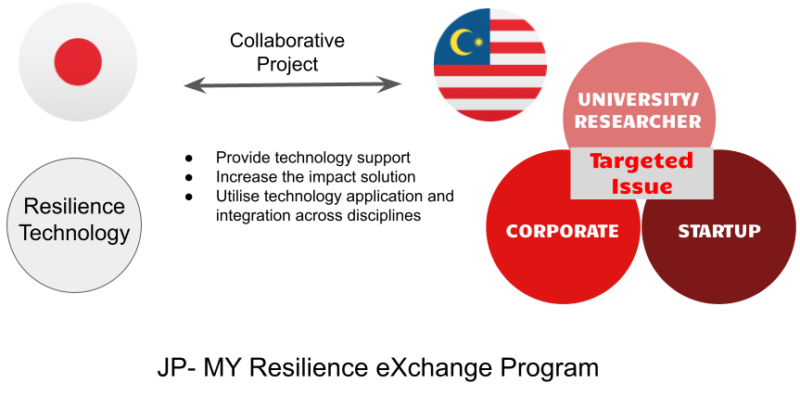News
Program Overview
JP-MY Resilience Xchange Program (RXP) is a co-creation platform for startups, researchers, and companies in Japan and Malaysia to collaborate and face disaster and environmental challenges.
We aim to create new solutions to flooding and water resource problems, which are increasing due to climate change, by bringing together the technologies and knowledge of both countries.
background
Rapid urbanization and climate change in Malaysia have resulted in frequent flooding and other disasters.
After the floods, issues such as water pollution and drainage system failure have been highlighted and require immediate action.
Japan's Strengths
Japan has cultivated some of the world's most advanced resilience technologies through its experience in the face of diverse disasters such as earthquakes, tsunamis, and torrential rains.
Earthquake-resistant buildings, tsunami embankments, rescue and risk assessment technologies using drones and robots, and early warning systems based on weather data will also make a significant contribution to solving Malaysia's problems.
Program Objectives
Promotion of mutual understanding: Understanding each other's culture, business practices, and technical methods.
Integration of Japanese technology: Accelerate utilization through demonstration, co-creation, and localization in Malaysia.
Establishment of issue-specific working groups: Formation of international working groups for water resources and climate change issues.
Support for overseas expansion of Japanese companies: Support strategic overseas expansion through ecosystem building and public-private partnerships.
Strengthening long-term cooperative relations: Strengthening Japan-U.S. cooperation in environmental and water-related fields to contribute to the sustainable development of the region.
phase expansion
Phase 1 (establishment of working groups)
Academia, startups, and companies bring their expertise to co-create issue-specific strategies.
Phase 2 (project pitch)
Propose jointly developed solutions to stakeholders and proceed to demonstration.
Phase 3 (project implementation)
Long-term development through MoU signing, field trials, and co-creation with local communities.
Themes to be resolved
Water Pollution Countermeasures
Flood control and adaptation
Management of leaks and unaccounted for water
Expected Value
Expand networking among academics, startups, and businesses
Early access to advanced technologies
Market understanding and brand communication
Contribution to solving social issues
Practical educational opportunities for students
Contact
The Libanes Resilience Project
Tachibana ([email protected])
Sharifah Nabihah Binti Syed Othman ([email protected])

